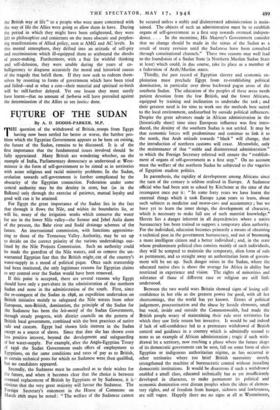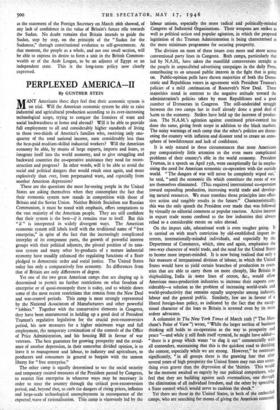FUTURE OF THE SUDAN
By A. D. DODDS-PARKER, M.P.
THE question of the withdrawal of British,, troops from Egypt having now been settled for better or worse, the further pro- blem which the Egyptian Government appears to be bent on raising, the future of the Sudan, remains to be discussed. It is of the first importance that the fundamental issues involved should be fully appreciated. Many British are wondering whether, on the example of India, Parliamentary, democracy as understood at West- minster is the form of self-government to be aimed at in territories with acute religious and racial minority problems. In the Sudan, evolution towards self-government is further complicated by the obscurity of the Egyptian connection. Federation under some central authority may be the destiny in store, but (as in the Balkans) only through the exercise of patience, mutual loyalty and good will can it be attained.
For Egypt the great importance of the Sudan lies in the fact that through it flows the Nile, and within its boundaries lie, or will lie, many of the irrigation works which conserve the water for use in the lower Nile valley—the Sennar and Jebel Aulia dams of the present, the Bahr river and Sudd drainage schemes of the future. An international commission, with functions approxima- ting to those of the Tennessee Valley, Authority, may be set up to decide on the correct priority of the various undertakings out- lined by the Nile Projects Commission. Such an authority could be made the guardian of the Nile waters, and so remove the un- warranted Egyptian fear that the British mightecut of the country's water-supply in a mood of political pique. Once such trusteeship had been instituted, the only legitimate reasons for Egyptian claims to any control over the Sudan would have been removed.
If this point is accepted, there are several reasons why Egypt should have only a part-share in the administration of the northern Sudan and none in the administration of the south. First, since the re-conquest of the Sudan in 1898, an expedition undertaken on British initiative mainly to safeguard the Nile waters from other European, non-British, domination, the principle of the Sudan for the Sudanese has been the leit-motif of the Sudan Government, through steady progress, with district councils on the pattern of British local government, combined with the best practices of native rule and custom. Egypt had shown little interest in the Sudan except as a source of slaves. Since that date she has shown even less positive interest, beyond the development and safeguarding of her water-supply. For example, after the Anglo-Egyptian Treaty of 1936 the Sudan Government made offers of employment to Egyptians, on the same conditions and rates of pay as to British, in certain technical posts for which no Sudanese were then qualified, but no candidates appeared.
Secondly, the Sudanese must be consulted as to their wishes for the future, and when it becomes clear that the choice is between eventual replacement of -British by Egyptians or by Sudanese, it is obvious that the very great majority will favour the Sudanese. The Foreign Secretary's statement in the House of Commons on March 26th must be noted: "The welfare of the Sudanese cannot be secured unless a stable and-disinterested administration is main- tained. The objects of such an administration must be to establish organs of self-government as a first step towards eventual indepen- dence. . . . In the meantime, His Majesty's Government consider that no change should be made in the status of the Sudan as a result of treaty revision until the Sudanese have been consulted through constitutional channels." These two reasons may well lead to the foundation of a Sudan State (a Northern Muslim Sudan State at least) which could, in due course, take its place as a member of a federation of Arab/Muslim states.
Thirdly, the past record of Egyptian slavery and economic ex- ploitation must preclude Egypt from re-establishing political domination, in particular over those backward pagan areas of the southern Sudan. The education of the peoples of these areas needs patient devotion from the few British, and the fewer Africans, equipped by training and inclination to undertake the task ; and their greatest need is for time to work out the methods best suited to the local environment, undisturbed by outside political influences. Despite the great advances made in African administration in the (historically short) time since European influence was first intro- duced, the destiny of the southern Sudan is not settled. It may be that economic forces will predominate and continue to link it to the north, that Arab attitude towards " black " will change, that the introduction of northern customs will cease. Meanwhile, only the maintenance of that " stable and disinterested administration " to which the Foreign Secretary referred will ensure the " establish- ment of organs of self-government as a first step." On no account must the welfare of the northern Sudan be subjected to the vagaries of Egyption student politics.
In parenthesis, the rapidity of development among Africans since the turn of the century is seldom realised in Europe. A Sudanese official who had been sent to school by Kitchener at the time of the reconquest once put it: " In some forty years we have learnt the external things which it took Europe 2,000 years to learn, about such subjects as medicine and motor-cars and accountancy ; but we have yet to learn the inner things, the development of character, which is necessary to make full use of such material knowledge." Herein lies a danger inherent in all dependencies where a native bureaucracy has been trained to support a temporary alien authority. For the individual, education becomes primarily a means of obtaining a technical post in the government bureaucracy, and not of becoming a more intelligent citizen and a better individual ; and, in the state whose predominant political class consists mainly of such individuals, they will be tempted to maintain the temporary, alien form of rule as permanent, and so straight away an authoritarian form of govern- ment will be set up. Such danger exists in the Sudan, where the educated native class is above the average for Africa in ability but restricted in experience and vision. The rights of minorities and tolerance of those of different race or religion are still little. understood.
Between the two world wars Britain showed signs of losing self- confidence in her role as the greatest power for good, with all her shortcomings, that the world has yet known. Errors of political judgement, procrastination and the abuse by hostile elements, small but vocal, inside and outside the Commonwealth, had made the British people weary of maintaining their rule over territories for which they saw little return but invective. It would be sad indeed if lack of self-confidence led to a premature withdrawal of British control and guidance in a country which is admittedly second to none as an example of African administration ; tragic if such with- drawal let a territory, now reaching a phase where the future shape of its democratic government can be seen, fall on some form of alien Egyptian or indigenous authoritarian regime, as has occurred in other territories where too brief British suzerainty merely strengthened the machine of bureaucratic control without installing democratic institutions. It would be disastrous if such a withdrawal enabled a small class, educated technically but as yet insufficiently developed in character, to make permanent its political and economic domination over distant peoples when the ideas of elemen- tary rights, and of freedom from hunger, sickness and lawlessness, are still vague. Happily there are no signs at, all at Westminster,
as the statement of the Foreign Secretary on March 26th showed, of any lack of confidence in the value of Britain's future role towards the Sudan. No duubt remains that Britain intends to guide the Sudan, step by step, on the principle of the "Sudan for the Sudanese," through constitutional evolution to self-government. At that moment, the people as a whole, and not one small section, will be able to express its desire to form a unit in the British Common- wealth or of the Arab League, to be an adjunct of Egypt or an independent state. This is the long-term policy now clearly expressed.































 Previous page
Previous page